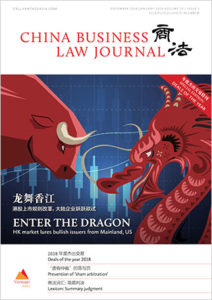The December/January issue of China Business Law Journal again features our annual award project Deals of the Year. Through careful editorial evaluation, we have chosen the most noteworthy achievements of China’s economic activities in the past year and recorded them in the report.

The mainland IPO market was mostly torpid, but there were still highlights, such as the Foxconn Industrial Internet’s A-share IPO – the largest issued by Chinese manufacturers to date. In contrast, Hong Kong became an attractive IPO venue after its listing reforms took effect in 2018. There was a wave of mainland companies heading towards Hong Kong to do H-share listings, including such big names as Xiaomi, China Tower and Meituan Dianping. Also noteworthy is the China Europe International Exchange (CEINEX), which saw Qingdao Haier complete the first D-share IPO in Frankfurt.
Chinese investors and exporters are facing a much tougher business environment. They are more likely than ever to face regulatory investigations and legal battles. There were some cases that might shed some light on how they can deal with such difficulties. For example, Advanced Technology & Materials and Qingdao Yunlu achieved favourable results in US 337 Proceedings.
Enter the dragon looks at Hong Kong’s resurging role in the global IPO landscape after the financial hub’s revised listing rules took effect last year. The listing reform has opened the door to companies from emerging and innovative sectors – companies with weighted voting right (WVR) structures, and biotechnology companies without any prior record of revenue or profit, can now apply for listings in Hong Kong.
This reform has already attracted many mainland companies to get listed in Hong Kong. But potential issuers should not anticipate H-share IPO to be a low-hanging fruit. For example, Hong Kong has also devised measures to limit the use of WVR structures, including detailed suitability requirements, a higher market capitalization threshold, enhanced disclosure and corporate governance requirements.
Hong Kong stock exchange also has strict rules on the terms of pre-IPO investments and the use of variable interest entity (VIE) structures, widely adopted by new technology companies.
The story will tell you more about the regulatory details you need to know before making the decision to do IPO in Hong Kong.





















